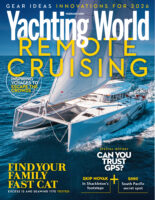The solo class has signed over all their commercial rights to a company set up by Britain's Sir Keith Mills. Is a revolution ahead?
Today a multimillionaire British businessman came to the Vendée Globe race village to announce a revolution to how the boats are to be raced and marketed. Surprisingly, since the place is being over-run by media, the international press was joined by only a couple of French reporters.
To the French media the Vendée Globe, once every four years, is the story and everything else the boats and skippers do is more or less incidental. But the skippers don’t see it this way and, as a class, they have just signed over all the commercial rights to a company set up by Sir Keith Mills (pictured above).
The deal with his newly established Open Sports Management is a potentially far-reaching sea change for the short-handed ocean racing class, and uniquely the 90 members of the class were unanimous in agreeing to it.
From next year on, Open Sports Management will take over the marketing and planning of a matrix of events designed to revive the declining class and boost its value to sponsors.
“This need to be a lot more economically viable,” says Sir Keith Mills. “What companies are looking for is consistency and payback and we need to find a way to make ocean racing more accessible.”
This does seems to be an ideal marriage. Sir Keith is probably the best placed businessman involved in sailing to take on the transformation and inject a dose of public passion into countries besides France. He made his money from marketing, he’s been behind an America’s Cup challenge, he is a considerable personal investor in Alex Thomson Racing’s solo campaigns. Oh, and he helped bring the Olympics to London.
The IMOCA class is struggling to maintain its vigour. Four years ago there were 30 skippers in the Vendée Globe, 16 of them sailing new designs. Tomorrow, only 20 will start, 6 of them in new boats.
The high costs have become hard to justify and it’s compounded by the haphazard nature of the class calendar. Apart from the Vendée Globe and Barcelona World Race it teeters precariously on shifting sands.
Once great events like the OSTAR/Transat have vanished off the list. The Route du Rhum and Transat Jacques Vabre see the class competing for attention with a growing breed of super-sized multihulls. Uncertainty about the future, observes Sir Keith, has created a vicious circle of decline.
First of all, Open Sports Management, based in Switzerland and underwritten initially by Sir Keith, will make a significant investment to improve camera technology on the boats.
“The commercialisation of selling TV rights is at best haphazard,” he tells me. “We will be investing to get a consistent feed. It’s got to be accessible and we’ve got to make the stories better known to more people in the world and build the audience with some events that are attractive to teams and sponsors.”
The company will not run races itself but will agree with the class about where and when to compete. The solo Vendée Globe and the two-handed Barcelona World Race will stay as the prime long-distance races and two more will be added so that there will be one major event every year of the four-year cycle.
The plan will be signed off by IMOCA annually so although it will not be mandatory for any skipper or sponsor to take part in all events there will be consensus about the programme.
As to what these other races will be, and how they should be run, that is yet to be decided. “We’ve got an idea, but not a plan yet. We’ve got to meet with all the skippers and try to understand what they want, and then we’ll turn it into a plan,” says Sir Keith.
He adds that the certainty of a fixed programme will make it easier for an organiser to negotiate commercial deals with host ports, and cites the success of the Volvo Ocean Race in making these deals pay.
“We want to have 25 skippers here [at the Vendée Globe] next time with more nationalities, and the only way to do that is to change the economics,” he says.
He says he is looking at markets in Asia and South America in the longer term, and at today’s press conference a TV arrangement was announced with a Chinese broadcaster.
It’s clear that Sir Keith Mill’s aims for the class are ambitious. If Open Sports Management is successful in creating an international appetite for short-handed racing it will change the face of this type of racing. It will, in the process, dilute the dominant French culture.
“Look at the Tour de France,” he offers. “It has successfully captured a global audience with a very French proposition and successfully made it international. It happened over a long time. But you need a big consumer-facing company to come in and do it, sponsors like Team Sky or Sainsbury’s, who know how to get to consumers.”
Sir Keith is talking Anglo-Saxon language here, quite literally foreign to the small-to-medium local businesses on which the Vendée Globe was founded. Even some of the big current sponsors, such as Banque Populaire, have no interest and no markets outside France.
Yet the IMOCA class has signed away its nationality papers. I wonder if the French press might have missed something of a Maastricht Moment here.
Skippers and sponsors obviously see this deal as essential. Still, I have a feeling that the process of becoming international is at times going to be uncomfortable and contentious.
Like any club committee or parish council with a lot of strong-minded individuals, IMOCA has more politics than the Vatican. Perhaps it will feel like room temperature to Sir Keith after the white heat of the America’s Cup. But still, interesting times ahead.




